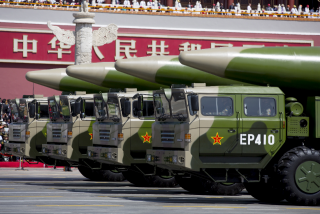China Is Not the Soviet Union: Applying Kennan’s ‘Long Telegram’
While Kennan observed that “Moscow sees in the UN not the mechanism for a permanent and stable world society founded on mutual interest and aims of all nations,” Beijing today in fact does see the UN as such a mechanism—albeit with a somewhat different vision than most Western powers for what such a “world society founded on mutual interests” would look like.
Kennan made several summary observations about the Soviet Union which, by comparison, arguably highlight the greater challenge posed by China. “Soviet power,” he wrote, “does not take unnecessary risks” and is “highly sensitive to the logic of force. For this reason it can easily withdraw when strong resistance is encountered at any point.” This logic may not apply to Beijing today, because Chinese leaders appear to calculate that the balance of power and leverage is shifting in their favor. Kennan judged in 1946 that the “Soviets are still by far the weaker force.” The same cannot be easily said about China in 2021. Moreover, while Kennan observed that “all Soviet propaganda beyond the Soviet security sphere is basically negative and destructive” and “should therefore be relatively easy to combat,” Chinese propaganda has been scoring points in recent years because of the dysfunctionalities of the United States and the relative success of China’s model of governance and economic development.
Kennan concluded the Long Telegram with two recommendations on what the United States needed to confront the Soviet challenge. Both apply emphatically to the U.S. contest with China. The first was the need to “apprehend, and recognize for what it is, the nature of the movement with which we are dealing” and see to it that “our public is educated to the realities of [the] situation.” Today it is especially important that the nature and scope of China’s intentions and ambitions not be exaggerated—especially not to include the Soviets’ rejection of peaceful coexistence or their ostensible determination to destroy “our traditional way of life” and “the international authority of our state.” Kennan observed that “there would be far less hysterical anti-Sovietism in our country today if the realities of this situation were better understood by our people.” The same applies to China, but not because China is as relatively weak as he deemed the Soviet Union to be, or because the U.S. stakes in Russia were “remarkably small. We have here no investments to guard, no actual trade to lose, virtually no citizens to protect, few cultural contacts to preserve.” None of that describes the U.S. relationship with China today. But there would be far less hysterical fear of China if Beijing’s strategic objectives were correctly understood to be less than the existential or zero-sum threat to the United States that is widely portrayed.
Like his first recommendation, Kennan’s second applies more today than it did in 1946: “Much depends on the health and vigor of our own society. . . . Every courageous and incisive measure to solve the internal problems of our own society, to improve the self-confidence, discipline, morale and community spirit of our own people, is a diplomatic victory over Moscow.” And so will they be against Beijing.
Paul Heer is a Distinguished Fellow at the Center for the National Interest and a Non-Resident Senior Fellow at the Chicago Council on Global Affairs. He served as National Intelligence Officer for East Asia from 2007 to 2015. He is the author of Mr. X and the Pacific: George F. Kennan and American Policy in East Asia.
Image: Reuters

